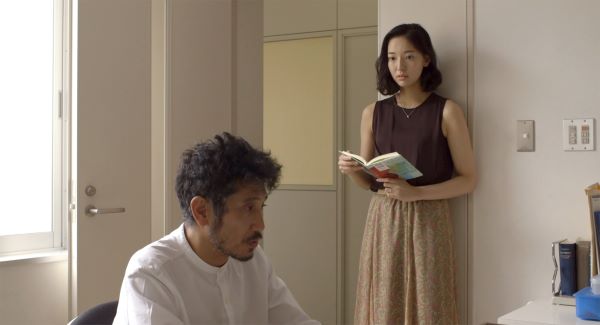![]() Wheel of Fortune and Fantasy, one of two films by Ryusuke Hamaguchi being released in theaters this year—the other being his Haruki Murakami adaptation Drive My Car—is, as so often happens with international films, much more accurately represented by its original Japanese title, Coincidence and Imagination, than its English translation. Those two phenomena are at the heart of the three short films, linked thematically rather than narratively.
Wheel of Fortune and Fantasy, one of two films by Ryusuke Hamaguchi being released in theaters this year—the other being his Haruki Murakami adaptation Drive My Car—is, as so often happens with international films, much more accurately represented by its original Japanese title, Coincidence and Imagination, than its English translation. Those two phenomena are at the heart of the three short films, linked thematically rather than narratively.
The onscreen subtitle, Three Short Stories by Ryusuke Hamaguchi, highlights the film’s literary qualities by pointedly not describing these works as short films, notwithstanding the fact that these vignettes have separate titles and credits. Remarkably, these allusions to literature don’t compromise the cinematic achievements, but instead lend a deeper, poignant resonance, especially in the final story. In fact, one can detect the distinct influence of John Cassavetes, whom Hamaguchi cites as inspiration, since so much hinges on the uniformly excellent performances.
The first story, “Magic (or Something Less Assuring),” sees model Meiko (Kotone Furukawa) and her friend Tsugumi (Hyunri) engaging in a lengthy conversation in the back of a cab after Meiko’s fashion photo shoot, during which Tsugumi gushes excitedly about the previous night she spent with her new boyfriend. They didn’t have sex, she says, but instead engaged in erotically charged conversation. Here is where the titular “coincidence” comes in: the man Tsugumi describes sounds suspiciously like Meiko’s ex-boyfriend Kazuaki (Ayumu Nakajima), whom Meiko broke up with recently. Later, after she leaves Tsugumi, Meiko confirms that her intuition is indeed correct when she angrily confronts Kazuaki at his office where he’s working late, revealing that she’s never really gotten over him. The tension derives from the obvious question of whether Meiko will blow up her friendship with Tsugumi by revealing their shared connection to Kazuaki.
The title of the centerpiece, “Door Wide Open,” refers to the self-preservation policy of college professor Segawa (Kiyohiko Shibukawa), who insists on never closing his office door, reasoning that this extreme transparency will ensure that he can never be accused of behaving in any untoward way with his students or anyone else. Not to spoil things too much, but this episode’s denouement recalls the proverb about what happens to the best laid plans of mice and men.
The final and strongest episode, “Once Again,” shot during Japan’s Covid-19 lockdown, employs a lightly dystopian premise: a massive global computer virus has leaked the entire world population’s personal and institutional secrets and forced all communications offline. The subsequent absence of Google and social media makes possible the encounter between two women, Natsuko (Fusako Urabe) and Nana (Aoba Kawai), who meet by chance on opposite sides of an escalator. Each initially believes she may have known the other from many years ago. This episode is a beautifully executed illustration of how playacting and performance can help to heal long-festering emotional wounds and achieve some sort of closure.
Hamaguchi’s breakthrough 2015 feature Happy Hour was a five-hour masterwork that made an indelible impression on many viewers, myself included. Wheel of Fortune and Fantasy proves Hamaguchi to be equally adept at the short form, making him one of the most versatile and continually surprising directors currently working.

















Leave A Comment